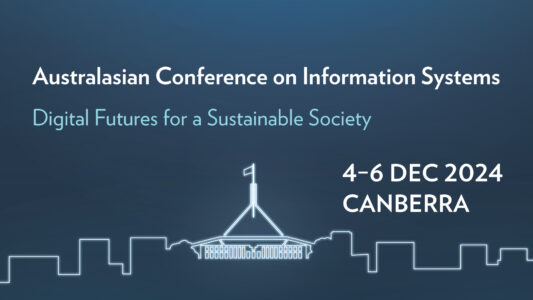The Australasian Conference on Information Systems (ACIS 2024) was hosted by the University of Canberra in Canberra, the capital of Australia, from 4 December to 6 December 2024. In its 35th year, the Australasian Conference on Information Systems is the premier conference on the Information Systems discipline in the Australasian region.
Digital Futures for a Sustainable Society
Building digital futures for a sustainable society involves utilizing technology to address environmental, social, and economic challenges while ensuring that the benefits are inclusive and equitable. As technology advances and organizations transform, the need to integrate sustainability principles into digital practices is even more critical. Technologies for the future need to be built according to regenerative designs to improve economic resilience, foster digital sovereignty, and achieve social equity.
By combining digital solutions with sustainable practices, societies can work towards a more resilient, effective, and inclusive future. It is crucial to prioritize ethical considerations, regenerative principles, data privacy, and security to ensure that the implementation of digital technologies aligns with sustainability principles.
The Australasian Conference on Information Systems (ACIS 2024) was hosted in Canberra, the capital of Australia, from 4 December to 6 December 2024. Canberra, which means “the meeting place” in the local Ngunnawal language, is one of the world’s most sustainable cities. Attendees from around the globe came together in Canberra to share research insights and perspectives about how digital technologies can promote sustainability and facilitate a resilient economy that works for the common good.
Submissions from 2024
Unpacking the Relationship between Creativity and GenAI: The Role of Knowledge and Expertise, Petros Chamakiotis and Niki Panteli
Empowering Good: Technology Enabled Corporate Benevolence, Thamali Chandrasiri, Wasana Bandara, Michael Rosemann, and Nadine Ostern
Examining the Development Trajectory of Online Review Helpfulness: A Perception-Affordance-Actualization Perspective, Tzu-Yao Chang, I-Ying Wang, and Chen-Hao Huang
Chatbot for SMEs in the Customer Service Sector: An Overview of the Literature, Vanessa Chan and Ruonan Sun
The Past, Present, and Futures of Artificial Emotional Intelligence: A Scoping Review, Angelina Chen, Raffaele Ciriello, Zara Rubinsztein, and Emmanuelle Vaast
How Governments Communicate Climate Change on Short Video Platforms: Tiktok and Douyin, Guanglei Cheng, Yiteng Zhang, Polina Konovalova, Xiaoyi Kuang, and Charles Chang
Digitally-enabled Boundary-Spanning in Achieving Resilient Government, Yan-Yi Chen, Tzu-Yao Chang, and Chen-Hao Huang
Partial Least Squares Approaches for Detecting and Controlling Common Method Variance: A Monte Carlo Assessment of All Previous Approaches Plus a New CLC2 Approach, Wynne W. Chin and Anh L. Huynh
Beware of Conceptual Ambiguity, Conceptual Inconsistency and the Correspondence Between Theoretical Concepts and Statistical Testing: An Example from Cognitive Fit Theory, Wynne W Chin, Shenoli Perera, and Sebastian K Boell
The Changing Nature of Innovation in the Age of AI: a Review based on the Affordance and Constraint Perspective, Duc-Nghia Chu, Hind Benbya, and Van-Hau Trieu
Organizational perspectives on mandating AI transparency, Ha Thanh Chu, Babak Abedin, and Olivera Marjanovic
Raising Cardiovascular Disease Knowledge and Awareness: Designing Health Apps for Young Adults, Claris Chung, Zenan Yu, and Anushia Inthiran
Pluralistic Digital Harm Analysis: Combining Ethical, Legal, and Historical Views on Corporate Evil, Raffaele F Ciriello and Sarah Koegel
Multi-Stakeholder Risk Assessment of Socio-Technical Interventions, Roger Clarke and Katina Michael
Method Support for Diverse Epistemological Claims in Design Science Research, Stefan Cronholm
From Digital Divide to Information Equity in Public Health for Visually Impaired People: Developing a Research Agenda, John Paul Cruz, Shanton Chang, Piers Gooding, and Simon Coghlan
Designing a Hybrid Intelligence System for the Facilitation of Group Collaboration, Izabel Cvetkovic, Svenja Streek, and Eva Bittner
Capable - A Framework for Assessing Software Architecture Development Capability for Public Health Information Systems Projects, Anthony Dang and Ghassan Beydoun
Using Artificial Intelligence to Detect Underlying Issues in Projects: Seeing Beyond Current KPIs and Project Status Reports, Ryan Darby and Michael Lane
How does the use of AI affect the outcomes and values of the IS development process?, Deshanjali Diyasena, Maduka Subasinghage, and Harminder Singh
Conceptualising People, Process, Technology, Data, Governance and Continuous Improvement (2PTDGC) as a Framework to Explore the Cybersecurity Awareness and Process of Australian Medical Practices, Dany Duong, Hamed Sarbazhosseini, Mohammad Abu Alsheikh, and Wanli Ma
A Qualitative Exploration of the Impact of Social Media Disinformation on Social Media Use, David A. Eccles, Sherah Kurnia, Nicholas Geard, and Tilman Dingler
Embracing Context: Reframing Digital Inequality, Mekhala Hansini Adhikari Egodawele, Dirk Hovorka, and Sebastian Boell
Drivers of generative AI acceptance in an ODFL institution through the lens of the Technology Acceptance Model (TAM), Samuel Ekundayo and Chris Niyi Arasanmi
AI in Project Memory and Learning: But Not All Blueprints Are the Same, Ali Eshraghi


